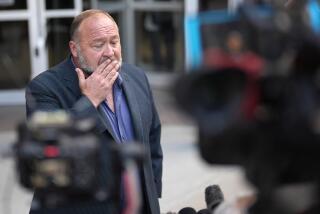Local S & L Victims Reassured : Crime: U.S. attorney tells small investors burned by Charles Keating Jr. that the government supports their claims to assets forfeited by the ex-Lincoln Savings chief.
- Share via
VAN NUYS — Small investors in Charles H. Keating Jr.’s company, meeting with a top federal prosecutor Tuesday, were jubilant after he assured them that the government would support their claims to any assets forfeited from the convicted former operator of Lincoln Savings & Loan.
“If we do make any recoveries, we will make every effort to distribute a significant portion to the fraud victims,” U. S. Atty. Terree A. Bowers told a group of about 175 small investors in Lincoln’s parent company, American Continental Corp.
Tuesday’s meeting at the Van Nuys Recreation Center was the first between the Lincoln/ACC Bondholders Action Committee and Bowers, whose office prosecuted Keating on racketeering and fraud charges. The financier was convicted in January and later sentenced to 12 years and seven months in prison.
Small investors in American Continental, including bondholders who bought their securities at Lincoln branches, lost a total of $286 million. In lawsuits, they have won settlements totaling $272 million, and have collected about $199 million of that amount so far.
A jury verdict, reduced by a judge to $1.8 billion, is largely uncollectible because all but one of the defendants remaining at the end of trial were bankrupt or out of money.
The bondholders, mostly elderly, unsophisticated investors, account for 69% of the total loss. So far, they have received 49.85 cents for every dollar lost and will probably end up with about 70 cents on the dollar after payments from certain settlements are made over the next several years.
Keating has said he is broke and has no hidden assets, but the federal government is pursuing a search for ill-gotten gains that it believes he has stashed away, possibly overseas.
During the federal case, prosecutors indicated that bondholders would benefit from the forfeiture of assets. Bowers said Tuesday that the Lincoln/ACC group had requested a meeting and that he wanted to assure them that his office was making a “110% effort” in its search for assets.
“We’re going to give it our best,” he said. “We’re working on this full time, but I can’t discuss any details.”
Jeri Mellon, a coordinator of the bondholders group, applauded Bowers’ comments. “We’re very encouraged to know they’re going to distribute money to the bondholders,” she said. “We’d always been told before that the money would go to the federal government” to pay its costs.
Tom Shelley of West Hills, another coordinator of the group, noted that, in an unusual action, federal prosecutors allowed bondholders to proceed with their civil suit against Keating and other defendants before the federal criminal trial. “It’s incumbent on them to share overseas assets . . . because they had the luxury of watching us go first, and that made it easier for them,” he said.
Bowers also pointed out to the bondholders that, compared with victims of other investment scams, they had fared extremely well in recovering their losses. “They’re getting 50 cents on the dollar,” he said. “Some victims get nothing at all or a much smaller percentage.”
The Lincoln/ACC Bondholders Action Committee is one of several bondholder groups that have formed throughout the Southland for mutual support and action. In other business at Tuesday’s meeting, Mellon vigorously defended the bondholders’ lawyer, Joseph W. Cotchett Jr., who has been criticized by some investors for a lack of attention to their case and acting slowly to distribute money from settlements.
Since Cotchett won their civil suit last year, he has had to take other cases, she said, adding: “Joe has to earn a living. He’s not as easy to catch as he was before.”
Regulators seized Irvine-based Lincoln in April, 1989, a day after Keating put the thrift’s parent company, American Continental Corp. of Phoenix, into bankruptcy. A taxpayer bailout of $2.6 billion makes Lincoln one of the nation’s costliest thrift failures.
More to Read
Inside the business of entertainment
The Wide Shot brings you news, analysis and insights on everything from streaming wars to production — and what it all means for the future.
You may occasionally receive promotional content from the Los Angeles Times.










